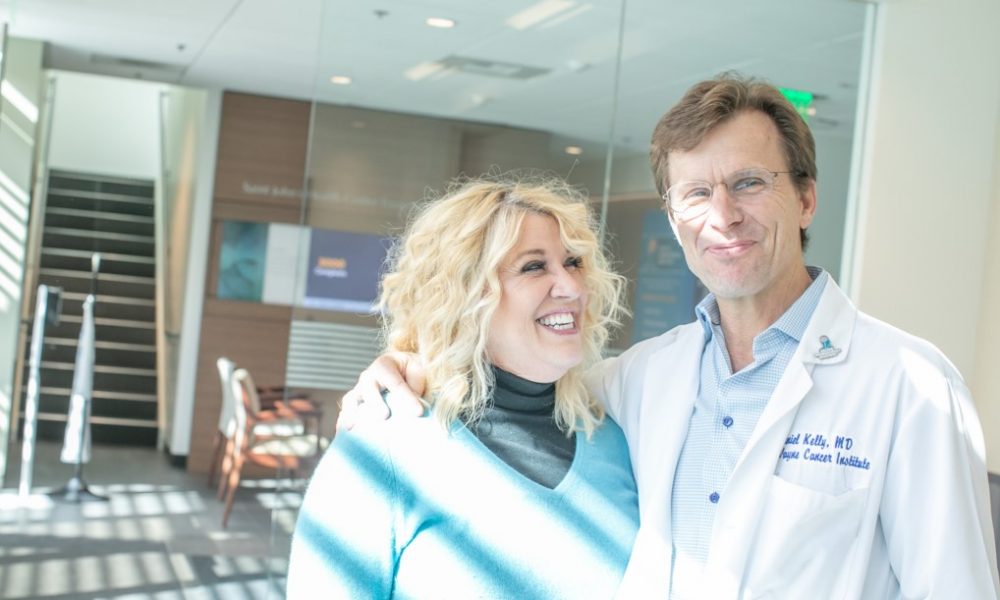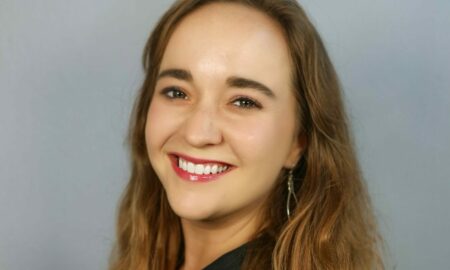

Today we’d like to introduce you to Sharmyn McGraw.
Sharmyn, can you briefly walk us through your story – how you started and how you got to where you are today.
My story is about the best kept secret in medicine…
I went from a petite dress size 2 to an obese size 22 in just one year. I went from athletically fit to barely able to walk upstairs. One of my closest girlfriends was a former Miss Universe and actor in Hollywood; we looked like sisters. We often hung out socially with those in the entertainment biz where anorexia is a compliment—not a disease.
But in 1993, at the age of thirty-one, I started to gain weight and lots of it. I ate a very healthy diet; I worked out five to seven days a week and trained with a fitness trainer just as I had always done, but the weight piled on. While my friends were busy planning their weddings and starting their families, I began my journey of the next seven years, seeking help from doctors all over California for a correct diagnosis and treatment. My beautiful thick, long blonde hair fell out by the handfuls. I got up to nearly 250 pounds, but the odd weight gain was mostly in my round moon face, and my stomach stuck out over fifty-four inches. Soon, many other symptoms started: I had constant anxiety, and I felt like I wanted to come out of my skin from the constant nervous energy racing through my body.
Nighttime was the worst; while I should have been sleeping, I paced my apartment to help slow down my racing heart. I felt nauseous from anxiety 24/7. I slept fifteen to twenty minutes at a time, but once I’d fall asleep, I would jolt awake with a shot of more nervousness pumping throughout my body. Sometimes I’d go days with only a few hours’ sleep.
Soon my blood pressure had to be controlled by medication; I also needed medication for anxiety and depression just to function. As a single woman, I needed to be able to keep my job; I needed to keep my medical insurance so I could keep seeking help from doctors. Although there were so many times when I wanted to give up, I had to keep going.
All the medical professionals said there was nothing medically wrong with me; just eat well and exercise more was their sage medical advice. I knew they were missing something as none of this was in my nature. A person doesn’t go from being thin, happy, and full of life to gaining over 100 pounds and enduring chronic anxiety and depression for no reason.
I continued for seven long years seeking help from general doctors to endocrinologists to gastroenterology specialists, rheumatologists, hematology experts, and even psychologists. All were highly respected and highly educated; unfortunately, none were willing to think outside their narrow perspective; none of these medical professionals wanted to listen to me, who in their words “let herself go.”
They would not believe me when I told them I was truly eating well and exercising properly but instead, offered more and more prescription drugs. When I said I didn’t want to take the drugs, and I wanted to find out what was causing me to be so sick, they wrote me off as unwilling to help myself. I was madly frustrated and felt betrayed by the medical community as well as society.
Many friends and even some family members felt I was causing myself to be sick. I’m not a shy personality, and I had no problem speaking up. Loudly, I begged for proper diagnosis; I begged for proper treatment. I told everyone, loud and clear, there was something medically killing me, and I wanted my life back, but they continued to blame me for my laundry list of poor health issues.
Eventually, I was so sick, I accepted that this undiagnosed illness was going to kill me eventually, but I was determined NOT to die before I found out what disease had turned my health upside down! I wanted to make sure other people did not have to suffer from this horribly embarrassing, lonely, debilitating disease. So, I started my journey to save myself, and whoever else was suffering like me.
Unlike today, back then, I couldn’t simply Google my symptoms, so I had to research by going through all my medical records. I remained persistent until I got copies of everything I needed. Through the years many doctors suggested I had hormonal issues, but they attributed any hormonal abnormalities to the fact I was obese and suggested if I lost weight, all my health problems would be gone. They were like an annoying, broken record.
But I didn’t go to medical school, so I had to rely on my intuition and the fact that I knew my body better than anyone else. I had a hunch the hormone issues were causing ALL my health issues. Fortunately, while going over thousands of pages of lab results and doctor’s notes, among innumerable discrepancies of the medical opinions and endless mismanagement of my healthcare, I also found a few clues of where to start.
I borrowed a friend’s computer and typed in Cortisol. According to my health records, this hormone had only been tested once in seven years, and it registered as Very High—Above Normal level. The doctors said it was high because I was overweight, but I wanted to see for myself. And up on the computer screen popped an article published by the Pituitary Network Association,www.pituitary.org.
The article’s headline read: “Cushing’s Disease.” In one of my previous medical reports, a doctor wrote he ruled out Cushing’s syndrome. This article proved him uneducated about proper testing for Cushing’s, and he was very wrong.
Cushing’s disease is a secondary disease caused by a pituitary brain tumor. The pituitary is a small, bean-shaped gland, less than one centimeter in size, and referred to as the master gland. It sits at the base of our brain between our optic nerves and carotid arteries. This small but powerful gland controls our quality of life by producing major hormones.
A Cushing’s tumor produces high levels of adrenocorticotropic hormone, (ACTH), which in turn signals the pituitary gland to stop producing the normal production of ACTH. One of the key functions of the pituitary gland is to keep us alive by signaling the adrenal glands when to produce and when not to produce Cortisol, our one life-sustaining hormone. However, the ACTH producing tumor never shuts off the production of ACTH, causing the pituitary to stop its normal feedback system with the adrenal glands.
Therefore, the adrenal glands never stop overproducing our fight or flight hormone, cortisol. For years the medical community and others told me that my health issues were all in my head. Well, in fairness, they were right. Luckily for me, I knew I was not causing this madness. Although it still sounds strange to say, I was so happy to find out that I had a serious and life-threatening pituitary tumor because, for the first time, I knew where to start my fight.
Once I suspected I had Cushing’s disease, I had to find the experts to confirm the often-complicated diagnosis. And that’s when the universe guided me through more research to meet the team that helped save my life! Dr. Pejman Cohan, my neuro-endocrinologist, and Dr. Daniel Kelly, my neurosurgeon, the director of the Pacific Neuroscience Institute in Santa Monica, CA. My angels were in my own backyard!
Dr. Cohan soon confirmed my diagnosis of Cushing’s disease, and it was Dr. Kelly’s difficult task to remove the tiny tumor that wreaked so much havoc. On April 14, 2000, Dr. Kelly successfully removed the tumor, and the next chapter of my journey began: helping others who suffer from this horribly underdiagnosed, misunderstood, life-threatening disease.
For the past nineteen years, I have been honored as a pituitary patient advocate spokesperson both nationally and internationally. Pituitary Tumors are the Best Kept Secret in Medicine. I’ve remained dedicated along with a team of pituitary neuro-endocrine experts to raise public awareness and help educate, and in some cases, reeducate the medical community on recognizing the symptoms of a pituitary tumor and/or hormonal issues related to the neuroendocrine system.
Pituitary disease is uncommon but not rare; however, there are commonly four types of pituitary tumors: prolactin-producing tumors, acromegaly, caused by too much growth hormone, Cushing’s disease, too much ACTH causes a secondary disease of too much cortisol hormone, and non-functioning tumors, which have their own set of problems.
For more information, visit www.hormones411.org, and https://www.pacificneuroscienceinstitute.org/pituitary-disorders/
Or email Sharmyn at [email protected] or [email protected]
Join us for support and education Pituitary Patient Support Group Meetings: https://www.pacificneuroscienceinstitute.org/resources/patient-resources/patient-support-groups/.
We’re always bombarded by how great it is to pursue your passion, etc. – but we’ve spoken with enough people to know that it’s not always easy. Overall, would you say things have been easy for you?
I can say in all honesty the darkest part of my life, struggling for a correct diagnosis, has turned into the brightest part of my life. The pituitary tumor experts I work closely with: Dr. Daniel Kelly, Dr. Garni Barkhoudarian, Dr. Pejman Cohan, and a handful of others are truly amazing.
These teams of experts respect and value my patient advocate perspective, and they have restored my faith in our medical community. I’m honored to have traveled this difficult journey with these brilliant, caring, and compassionate doctors along with many others who are dedicated patient advocates.
But truly, what makes this journey rewarding and worth the endless hours we’ve all put into the proper treatment and awareness of pituitary disease is the patients. Seeing how far we have come to help raise public awareness and education in our medical communities makes me extremely proud I could be an important part of it.
Speaking with the patients, seeing them get their lives back, helping them to make good, educated decisions about their treatment is really what keeps us all going. And the icing on my cake has been meeting two of my closest friends, Krystina, who had a prolactin tumor, and Shady, who had acromegaly—both had pituitary surgery with Dr. Kelly, and they are leading healthy and productive lives. I love them like my sisters.
So, as you know, we’re impressed with Hormones411 – tell our readers more, for example, what you’re most proud of as a company and what sets you apart from others.
When I was growing up, I struggled all through school; learning wasn’t easy for me. One of my high school teachers had me stand up in the middle of her class in front of my peers while she berated and humiliated me over my poor grammar and spelling. I walked out of her class and never went back.
After that, I was petrified to write so much as a greeting card that someone would read. After barely graduating from high school, I was unable to pass the entrance exam for English 101 at our local college. I tested at a fourth-grade level. Earlier that year, I was diagnosed as severely dyslexic.
My high school in Southern California was overcrowded with 2100 students in my graduating class. My home life was chaotic, and there was no one there to help me either. I felt that my dream of becoming a writer was impossible. This was long before computers, so I stuffed my dreams of writing lighthearted mysteries way down inside.
But instead, I excelled at drawing, painting, graphic design, cartooning and photography; anything I could draw, design, capture or paint, I did extremely well. And I still love anything to do with creating art. After my surgery for the pituitary tumor, my passion to help others was bigger than my fear of writing. I knew I would have to write articles and correspond with medical professionals if I wanted to get their help and/or attention.
I created my first flyer, “They Were Right; It Was All in My Head—Pituitary Tumors. The Best Kept Secret in Medicine.” I was scared to death to let anyone see it, but I created a good design layout because of my graphic arts studies, and I finally worked up enough nerve to ask Dr. Kelly to look it over and edit it for mistakes. Dr. Kelly loved it, so after he made a few minor corrections, I was off and running!
The flyer traveled without the help of emails or social media, but rather it was distributed all over the country by people who read it and passed the flyer to someone they thought might have the same disease. This one little flyer helped save so many lives, and it started my patient advocate ball rolling. I took a couple of writing classes because I wanted to learn to be a better writer; one of the classes was to learn how to write for magazines.
I sent out thirteen query letters and got twelve rejections. But when the health editor from Woman’s Day magazine called me and asked if they could buy my story, I said, “I’m a writer; may I write it? And she said, yes! From there I continued writing and publishing my story and raising awareness about Pituitary disease. I’m not sure what was more rewarding, overcoming the challenges that had held me back with dyslexia or raising awareness about Cushing’s to over ten million readers; they both felt amazing.
Nineteen years after my pituitary surgery, it’s finally time for me to write my fun mysteries! I’m working on a three-book mystery series. I’ve finished the first draft, and I’m working on my revisiona. I hope to have, Dying to Date: Looking for Mr. Right but Finding Mr. Wrong, out in 2019; book two: Dying to Marry and book three: Dying to Divorce out after that. My Dying series website and Facebook page are coming soon. Praise to Lillian Nader, my amazing editor for her patience.
My goal is to get involved with speaking for schools to encourage kids not to let people discourage them from their dreams. It will always take hard work, but with dedication and a lot of effort, you can do what you love.
So, what’s next? Any big plans?
I have seen a lot of wonderful progress in the work Dr. Kelly and his colleagues are doing at the Pacific Neuroscience Institute to advance treatments and improve the quality of life for their patients with cancerous brain tumors, pituitary tumors and so many other areas of the neurosciences. They are truly a comprehensive Center of Excellence.
I plan to continue helping them and their patients, and I am also excited to write my mystery stories. I will continue to use my public platform to help raise awareness for pituitary disease. I hope to have the opportunity one day to inspiring children the importance of reading great books and telling their stories.
Contact Info:
- Website: www.hormones411.org
- Phone: 888-410-3334
- Email: [email protected]
- Facebook: https://www.facebook.com/PacificNeuroscienceInstitute/







 Image Credit:
Image Credit:
Kristin Andersen
Getting in touch: VoyageLA is built on recommendations from the community; it’s how we uncover hidden gems, so if you know someone who deserves recognition please let us know here.



















